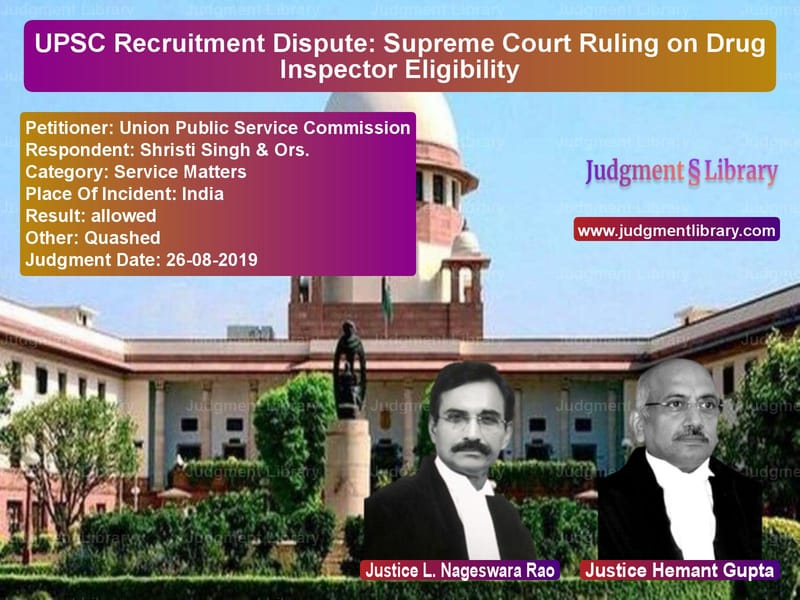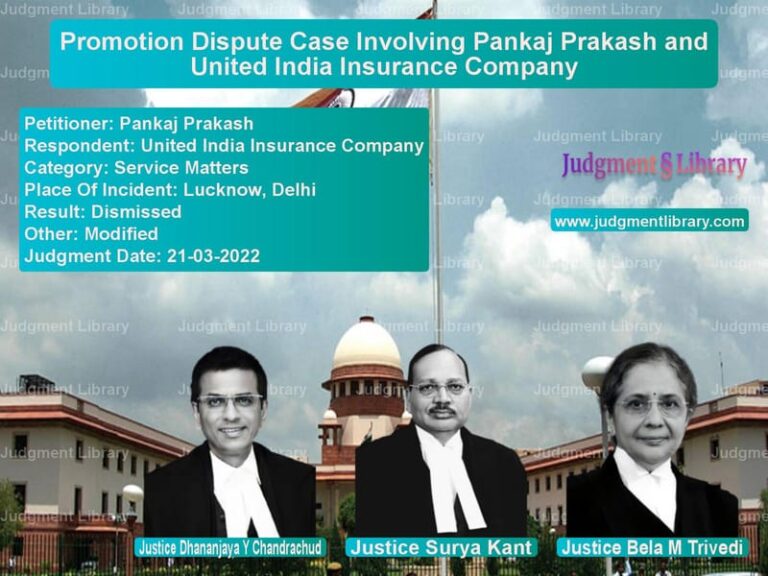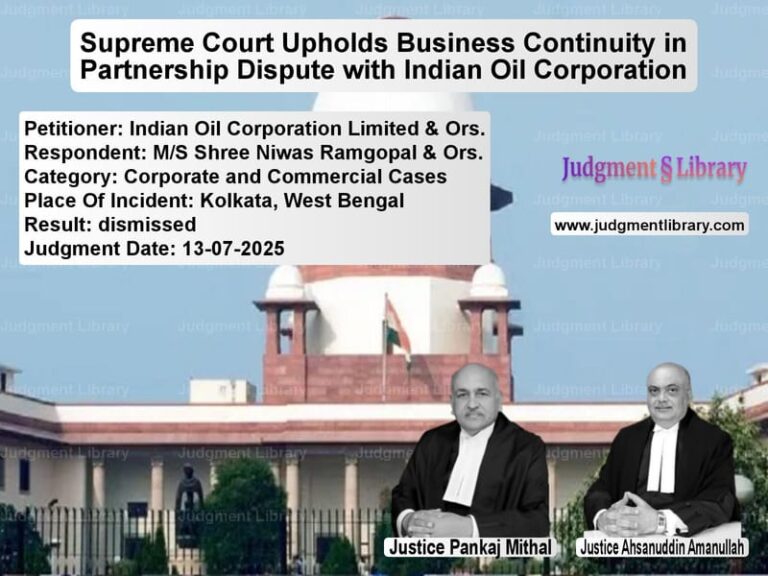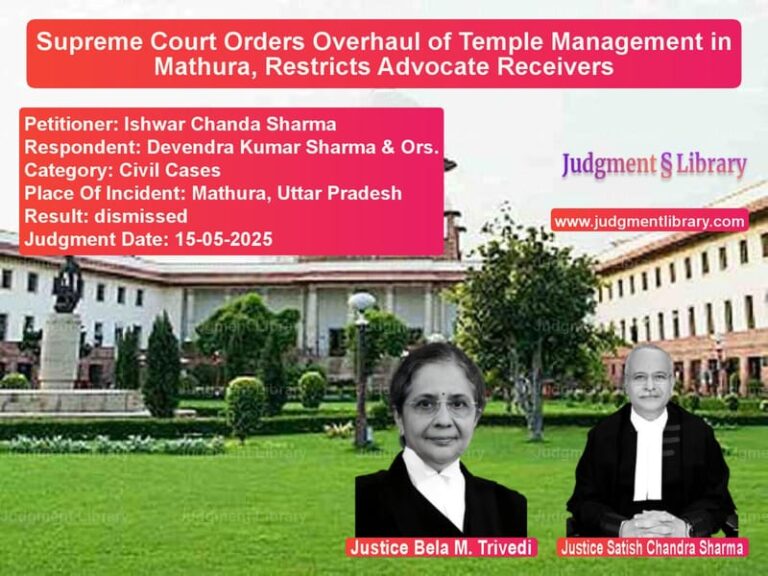UPSC Recruitment Dispute: Supreme Court Ruling on Drug Inspector Eligibility
The Supreme Court of India recently ruled in the case of Union Public Service Commission vs. Shristi Singh & Ors., addressing a crucial dispute regarding eligibility for recruitment to the post of Drug Inspector under the Central Drugs Standard Control Organisation (CDSCO), Ministry of Health and Family Welfare. The judgment clarified the interpretation of the experience requirement and the validity of supporting certificates in government recruitment.
Background of the Case
In 2015, the Union Public Service Commission (UPSC) issued Advertisement No. 04 of 2015, inviting applications for the post of Drug Inspector. The eligibility criteria for the position required:
- A degree in Pharmacy, Pharmaceutical Sciences, or Medicine with a specialization in Clinical Pharmacology or Microbiology from a recognized university.
- At least 18 months of experience in manufacturing or testing substances listed under Schedule ‘C’ of the Drugs and Cosmetics Rules, 1945, in a licensed laboratory.
Shristi Singh, the first respondent, applied for the post and was initially shortlisted for an interview. However, UPSC later disqualified her, citing insufficient proof of experience in testing Schedule ‘C’ drugs. Singh contested this decision before the Central Administrative Tribunal (CAT), which ruled in her favor, directing UPSC to consider her for appointment if she scored higher than the last selected candidate. The High Court upheld the Tribunal’s decision, prompting UPSC to challenge the ruling before the Supreme Court.
Key Legal Issues
- Whether the respondent met the 18-month experience requirement for the Drug Inspector post.
- Whether certificates submitted by the respondent adequately demonstrated compliance with the eligibility criteria.
- Whether the Tribunal and the High Court had the authority to interfere with UPSC’s decision on candidate eligibility.
Arguments by the Petitioner (UPSC)
UPSC defended its decision to reject Singh’s application based on the following grounds:
- The certificates she submitted did not clearly indicate 18 months of experience in testing Schedule ‘C’ drugs.
- The second certificate from M/s Alpa Laboratories was dated after her online application submission, raising concerns about its authenticity.
- The certificate mentioned that her work was unpaid and undertaken for “experience purposes,” which did not align with the official job experience requirement.
- UPSC followed the recruitment advertisement’s conditions strictly, and judicial interference was unwarranted.
Arguments by the Respondent (Shristi Singh)
Singh contended:
- She met the educational and experience qualifications required for the post.
- The rejection of her application was arbitrary and lacked a clear explanation.
- The Tribunal and High Court correctly directed UPSC to interview her and consider her candidature.
Supreme Court’s Observations
1. Strict Adherence to Recruitment Rules
The Court reiterated that recruitment authorities must adhere strictly to prescribed eligibility criteria. It stated:
“The requirement of 18 months’ experience must be fulfilled in accordance with the advertisement. Any deviation from this standard would be against the principles of fair selection.”
2. Issues with the Experience Certificates
The Court examined the two experience certificates:
- The first certificate from M/s Alpa Laboratories (dated 05.03.2014) did not explicitly mention experience in testing Schedule ‘C’ drugs.
- The second certificate (dated 17.03.2015) claimed relevant experience but was issued a day after Singh had submitted her online application.
The Court found the second certificate suspicious and noted:
“The certificate dated 17.03.2015 raises concerns as it was issued after the application was submitted and mentions unpaid experience. Such documentation does not align with the recruitment advertisement’s requirement.”
3. Tribunal and High Court’s Overreach
The Court ruled that judicial bodies should not interfere in recruitment decisions unless there is clear evidence of arbitrary action. It observed:
“The Tribunal and the High Court erred in interfering with UPSC’s decision. The eligibility conditions were clear, and UPSC’s rejection was based on valid concerns regarding the authenticity of the certificates.”
Final Verdict
The Supreme Court ruled:
- Singh did not meet the eligibility criteria due to insufficient proof of experience.
- UPSC’s rejection of her application was valid and justified.
- The Tribunal and High Court’s interference was incorrect, and their decisions were set aside.
- UPSC’s recruitment decision was restored.
Conclusion
This judgment underscores the importance of strict adherence to recruitment eligibility criteria. It sets a precedent for public sector hiring processes, affirming that candidates must meet all requirements precisely as stated in job advertisements. The ruling also limits judicial intervention in administrative decisions unless there is clear evidence of unfairness or illegality.
Petitioner Name: Union Public Service Commission.Respondent Name: Shristi Singh & Ors..Judgment By: Justice L. Nageswara Rao, Justice Hemant Gupta.Place Of Incident: India.Judgment Date: 26-08-2019.
Don’t miss out on the full details! Download the complete judgment in PDF format below and gain valuable insights instantly!
Download Judgment: Union Public Service vs Shristi Singh & Ors. Supreme Court of India Judgment Dated 26-08-2019.pdf
Direct Downlaod Judgment: Direct downlaod this Judgment
See all petitions in Recruitment Policies
See all petitions in Employment Disputes
See all petitions in Public Sector Employees
See all petitions in Judgment by L. Nageswara Rao
See all petitions in Judgment by Hemant Gupta
See all petitions in allowed
See all petitions in Quashed
See all petitions in supreme court of India judgments August 2019
See all petitions in 2019 judgments
See all posts in Service Matters Category
See all allowed petitions in Service Matters Category
See all Dismissed petitions in Service Matters Category
See all partially allowed petitions in Service Matters Category







